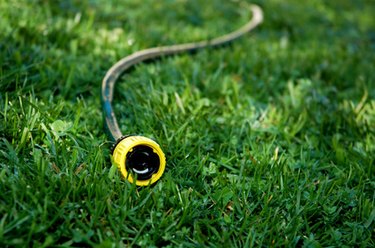
Homeowners may have heard about using milky spore to control grubs and improve lawns, but few understand exactly what it is and how it is used. Milky spore is a bacteria that is used to control Japanese beetles and similar species. Since it is a completely natural material, it does not adversely affect pets, humans or the environment. There are no known health risks associated with milky spore use, but care should be taken when working with the bacteria.
About Milky Spore
Video of the Day
Milky spore, or bacillus popilliae, is a bacteria that dwells naturally in soil. It is a rod-shaped bacterium that infects the grubs of Japanese beetles, which can cause serious damage to lawns and gardens. These grubs can dig deeper into the soil and survive during the cold months. Milky spore in the soil is eaten by the grubs during their active feeding season in the summer months. The bacteria reproduces inside the grub, killing it within 7 to 21 days. As the infected grub decomposes, it releases more milky spore into the soil. The spores can survive in cold weather and in drought conditions to continue to kill Japanese beetle grubs.
Video of the Day
How Milky Spore Is Used
Milky spore should be applied once with 1 tsp. placed every 4 feet. It should create a sort of checkerboard pattern across the lawn when applied, in order to make sure the lawn is fully covered. Each of the spots will contain as much as 100 million spores. Milky spore is too light to be applied with a broadcast spreader, so it must be applied by hand in concentrated form. Then, water the treated area to soak the spores into the soil. An oscillating sprayer used for 15 to 20 minutes over the treated area is sufficient to make the spores available for the grubs to eat. It is best used in late September or October in overcast conditions, according to the North Carolina State University Extension Service.
Benefits of Milky Spore
Milky spore does not work as quickly as chemical pesticides, but it is much safer for the environment and for areas where children and pets may be in contact with it. It only kills the grubs of Japanese beetles and other related insects, so insects that benefit plants are not killed. Also, you only have to apply it once.
Health Risks of Milky Spore
Milky spore is not toxic to humans or animals, but the spores are in a powder carrier form that can irritate eyes and throat. It also contains chalk. Wheezing, shortness of breath, tightness in the chest and coughing may occur in those with preexisting respiratory problems such bronchitis, emphysema or asthma.
Protecting Yourself When Using Milky Spore
Follow the package directions carefully when using milky spore. Using a mask and goggles will help prevent irritation.